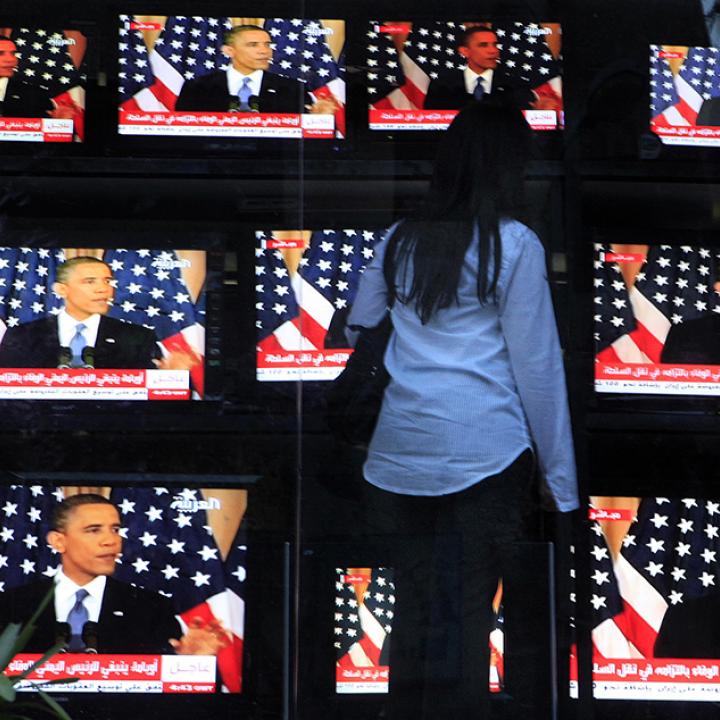
- Policy Analysis
- PolicyWatch 1969
What Arabs Don't Know about America (and How to Fix It)

On August 1, 2012, Prof. Mohammed S. Dajani Daoudi addressed a Policy Forum at The Washington Institute. Founder and director of the American Studies Graduate Program and a professor of politics and international relations at al-Quds University in Jerusalem, he served as a Washington Institute visiting fellow this summer. His works include A Bibliography of Arabic Books on American Affairs (2009). The following is a rapporteur's summary of his remarks.
To better understand Arab perceptions of America, it is useful to examine the publications about the United States that are circulated in Arab countries. Contrary to conventional wisdom, Arabs are readers and they especially like the popular, mass-produced books and booklets found on street corners and kiosks throughout the Middle East. Assessing the content of these publications provides a glimpse into what Arabs are reading about America.
To that end, an effort was undertaken to compile and catalog every book written in the Arab world about the United States. Initially, this was motivated by a desire to find appropriate material to use in a graduate program of American studies at an Arab university. But the findings had an even more profound implication -- they provided a window into the biased, distorted perception of U.S. politics and foreign policy held by so many Arabs.
In total, just over 1,000 books were collected. This shockingly low number alone says a lot about the poverty of Arab knowledge about America. Of the total, about 25 percent covered U.S. foreign policy, reflecting three dominant themes:
- the United States as policeman of the world, directing global politics to benefit U.S. interests;
- the Israeli lobby as the major force behind U.S. decisionmaking;
- and the United States as waging a war against Islam.
Typically, the authors of these books have never traveled to or studied in the United States, but that has no impact on their immense credibility and wide readership. This process is aided by the lack of copyright laws in Arab states, which allows publishers to print and sell books very cheaply. For its part, the U.S. government does sponsor the publication of a small number of books in the Arab world in an effort to combat the biases that appear in commonly read texts, but these U.S.-supported books have problems of their own, as they are often outdated, unavailable, too lengthy for Arab readers, or very expensive.
The American Studies Graduate Program at al-Quds University in Jerusalem was established in 2002 in part to combat the dissemination of biased information about the United States. Other such programs throughout the Arab world play a similar and necessary role. The idea is not to create centers of American propaganda, but institutions where Arab students can learn enough objective information about U.S. politics, culture, and society to make their own informed judgments about America. The al-Quds program has been successful, but it could achieve even greater success. In addition to focusing on the traditional elements of American studies (e.g., history, culture, language, and literature), a more innovative program would highlight courses, lectures, and programs on the core elements that have made America such a success -- ingenuity, creativity, and individuality. For example, stories of American businesses that began in garages only to expand into multimillion-dollar enterprises can inspire Arab students to think creatively, which itself is an important channel for promoting democracy.
Given its location in Jerusalem at the center of the Israeli-Palestinian conflict, the American studies program at al-Quds faces certain challenges. It took years before the Palestinian Ministry of Education recognized the program's legitimacy and value, giving it official certification only after becoming embarrassed that U.S. diplomats would hear of their refusal to do so. And given America’s longstanding support for Israel, students who pursue American studies often encounter societal pressure -- sometimes in the form of verbal harassment -- discouraging their interest in a country many consider to be the enemy.
In the program itself, the focus is on learning with an open mind: analysis rather than rote memorization, the most common way of teaching in Arab societies. A challenge that therefore emerges is finding educators who are capable of teaching in a way that differs from the standard approach in the region. This distinctive kind of educator is especially valued by the program.
The program includes an overseas exchange to the United States involving fifteen Palestinian, fifteen Israeli, and fifteen American students who participate in group projects to demonstrate how cooperation can transcend perceived hatreds among ethnic groups. The learning and collaboration fostered by the exchange and the American studies program as a whole encourage the sort of mindset that can help bring peace to the region.
In general, except for the most extreme cases of willful hatred, the question "why do they hate us?" should be changed to "why do they not understand us?" Education is the key -- not only can it help answer this question, but, with the proper resources and well-trained educators, it can help reconcile U.S. relations with the Arab world.
This rapporteur's summary was prepared by Heba Dafashy.



